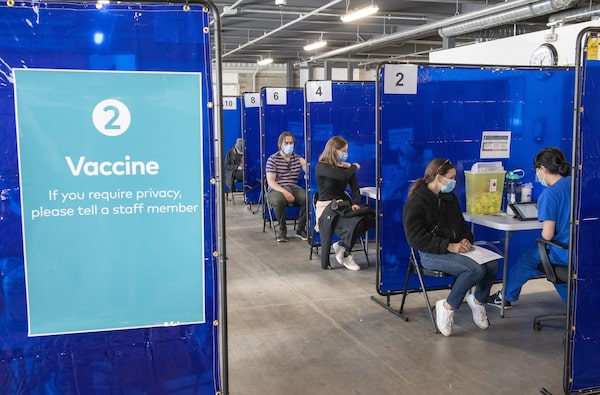
People receive their COVID-19 vaccination at the Ontario Food Terminal in Toronto on May 11, 2021.Frank Gunn/The Canadian Press
Ontario is speeding up second doses of COVID-19 vaccines in areas that are seeing a rise in the more transmissible Delta variant, but the government continues to resist calls to shorten the 12-week interval for those who got the AstraZeneca shot.
New modelling released Thursday shows the variant that is now called Delta, first associated with India, will likely be the dominant form of the virus by summer. The modelling, released Thursday by the COVID-19 Science Advisory and Modelling Consensus Tables, found that a second vaccine dose is more than twice as effective against the Delta variant than a single shot.
“It’s really important to make sure that, as much as possible, we accelerate second doses,” said Adalsteinn (Steini) Brown, the head of University of Toronto’s School of Public Health and the co-chair of the science table.
Canada vaccine tracker: How many COVID-19 doses have been administered so far?
Moderna, Pfizer, AstraZeneca or Johnson & Johnson: Which COVID-19 vaccine will I get in Canada?
Despite growing calls to reduce the wait time for AstraZeneca, the province said Thursday it is sticking to a 12-week interval between shots, arguing that timeline is most effective based on the available data. However, other provinces, such as British Columbia and Alberta, have allowed people to book second doses of the AstraZeneca vaccine after only eight weeks.
“The evidence to date suggests that the 12-week period is the best interval in between the first and second doses,” Health Minister Christine Elliott told reporters, calling that timeline “the gold standard.” Those who received AstraZeneca are eligible for either a second shot of that vaccine, or an mRNA one.
Irfan Dhalla, physician and vice-president with the Unity Health Toronto network of hospitals, said on social media that he hopes Ontario reverses course on the interval time. “That’s too bad. I hope this changes soon. Unfair to those who stepped up and got AZ,” he wrote on Twitter.
Those who received an mRNA vaccine, either Pfizer-BioNTech or Moderna, will be eligible for a second shot much earlier.
Beginning June 14, anyone who received a first shot on or before May 9 in seven regions with a high Delta prevalence will be eligible to receive a second dose, more than a month ahead of schedule. The eligible regions are Halton, Peel, Porcupine, Toronto, Waterloo, Wellington-Dufferin-Guelph and York.
Toronto Public Health will also focus its efforts specifically on 18 neighbourhoods with high incidence of COVID-19, low vaccine coverage and where the Delta variant has been identified, using mobile and pop-up units to reach vulnerable populations. The province is also launching mobile vaccine clinics at workplaces in Peel, York and Toronto beginning on June 20, and workplaces in Peel will also start offering second doses in hot-spot communities.
Still, some regions have not been meeting their daily vaccination targets, health officials said on Thursday, and Ontario’s COVID-19 vaccine distribution task force is working with public health units to ensure vaccines aren’t left sitting unused in freezers.
The province will only provide extra vaccine doses to regions with the Delta variant once current supply is utilized, the government said.
Lawrence Loh, Peel’s Medical Officer of Health, said he welcomes the strategy to accelerate second doses. He said when the province’s previous hot-spot strategy ended in late May, Peel was asked by the Ministry of Health to ramp down its vaccine efforts and held inventory to account for the return to per-capita allocation.
“We are now returning to full capacity and making use of all available inventory, and anticipate access to additional allocation for second doses in short order,” he said.
COVID-19 vaccine questions answered: dose mixing, life after the vaccine and more
On AstraZeneca, health officials said they are reviewing requests to speed up second doses. “This is under very active discussion,” said Barbara Yaffe, Associate Medical Officer of Health.
Dr. Brown said the science table is also studying the interval: “Our early look at it is that it could be shorter,” he said, adding that the table will make a formal recommendation to government after considering the issue.
Still, the latest modelling “is not a doomsday scenario,” he said, adding that by focusing on getting vaccines into high-risk communities quickly, “we’ve got a good chance of controlling the Delta variant, and actually a really good chance of a good summer.”
Ontario has already sped up second shots for adults 70 and over, as well as those who received first doses on or before April 18. So far, 73 per cent of adults in Ontario have received a first dose, and 11 per cent are fully immunized.
The changes to Ontario’s vaccine program come as the province enters the first step of its reopening plan on Friday. The plan, which moves slower than other provinces, will first allow restaurant patios, outdoor fitness classes, outdoor gatherings of 10 and non-essential retail stores to reopen at 15 per cent capacity. Ms. Elliott said it’s “too soon” to say whether the province will be able to move to the next step of reopening more quickly than previously announced.
Our Morning Update and Evening Update newsletters are written by Globe editors, giving you a concise summary of the day’s most important headlines. Sign up today.
 Laura Stone
Laura Stone